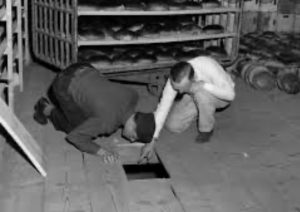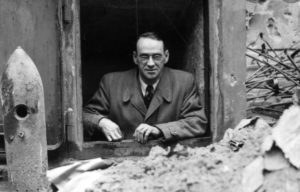Monthly Archives: August 2020
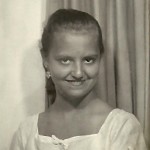
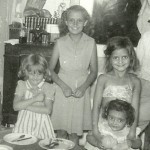 My Aunt Dixie Richards, the 8th child of my grandparents, George and Hattie Byer. Grandma and Grandpa kind of had three families…or so it seemed to all of us anyway. The first three were girls, Evelyn, Virginia, and Deloris. The second three were two boys, Larry and Wayne, with my mom, Collene in the middle. The last three were three girls, Bonnie, Dixie, and Sandy. By the time Aunt Dixie was five years old, she was an aunt. Her sister, Evelyn had married and given birth to a daughter named Sheila “Susie” (Hushman) Young. I’m sure it seemed strange to be a child of five, and have a sister who was married and a mother…but then, I was the second oldest child, so that situation couldn’t have happened with me. My youngest sister, Allyn (Spencer) Hadlock was an aunt when she was eight years old, so I’m sure she could relate to how Aunt Dixie felt at that time…both as a young aunt, or later as a teenaged aunt.
My Aunt Dixie Richards, the 8th child of my grandparents, George and Hattie Byer. Grandma and Grandpa kind of had three families…or so it seemed to all of us anyway. The first three were girls, Evelyn, Virginia, and Deloris. The second three were two boys, Larry and Wayne, with my mom, Collene in the middle. The last three were three girls, Bonnie, Dixie, and Sandy. By the time Aunt Dixie was five years old, she was an aunt. Her sister, Evelyn had married and given birth to a daughter named Sheila “Susie” (Hushman) Young. I’m sure it seemed strange to be a child of five, and have a sister who was married and a mother…but then, I was the second oldest child, so that situation couldn’t have happened with me. My youngest sister, Allyn (Spencer) Hadlock was an aunt when she was eight years old, so I’m sure she could relate to how Aunt Dixie felt at that time…both as a young aunt, or later as a teenaged aunt.

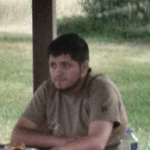
Being an aunt when you are just a kid yourself, means that you are a fun aunt. When the nieces and nephews are over, you get to take them outside or to your room to play. Of course, as the aunt gets older, those little ones might not be so much fun to have around. Teenagers aren’t always fond of little tag-a-longs. Of course, they forget that for their older siblings, these teenaged aunts were the tag-a-longs once. I’m sure that the older kids didn’t always want to have the responsibility of taking care of the little ones.
I think that Aunt Dixie must have liked taking care of the little ones though, because in later life she even ran a 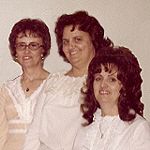
 daycare, and took care of many of the children in the family…as well as her own grandchildren, Jacob Liegman, Charles Williams, Gideon Williams, Noah Williams, and Mayme Williams. Taking care of her own grandchildren was a highlight of her life. She still sees them every day, and they love spending time with her and their grandpa, Jim Richards. The blessings of having children are the continuing line…the grandchildren. Today is Aunt Dixie’s 77th birthday. Happy birthday Aunt Dixie!! Have a great day!! We love you!!
daycare, and took care of many of the children in the family…as well as her own grandchildren, Jacob Liegman, Charles Williams, Gideon Williams, Noah Williams, and Mayme Williams. Taking care of her own grandchildren was a highlight of her life. She still sees them every day, and they love spending time with her and their grandpa, Jim Richards. The blessings of having children are the continuing line…the grandchildren. Today is Aunt Dixie’s 77th birthday. Happy birthday Aunt Dixie!! Have a great day!! We love you!!

 My grand nephew, Keifer Balcerzak is a computer programmer for the State of Wyoming. He loves his job, and is a great bread-winner for his family, but it isn’t his job that has made him the man he is today. I have not seen many men who have become a parent, and then had to immediately be the “rock” for his little family. Keifer and his wife, Katie, became the parents to Reece, a 2 months premature little girl, born in December 2017. That was a scary time for Keifer and Katie, and they had to be strong for their baby girl…and for each other. I can’t say for certain that Katie felt like falling apart, but I think most women probably would have felt like falling apart, and would need their strong husbands to hold them up in the face of such a serious situation. Keifer did that for Katie, as she recovered from giving birth, and dealt with the day to day concerns for Reece’s well-being. Her home-coming was a wonderful day for both of them, and in victory, they went home from Denver, Colorado to Casper, Wyoming to start their life. Their lives had changed much more than the normal amount that goes with having a baby. Staying positive was of the utmost importance.
My grand nephew, Keifer Balcerzak is a computer programmer for the State of Wyoming. He loves his job, and is a great bread-winner for his family, but it isn’t his job that has made him the man he is today. I have not seen many men who have become a parent, and then had to immediately be the “rock” for his little family. Keifer and his wife, Katie, became the parents to Reece, a 2 months premature little girl, born in December 2017. That was a scary time for Keifer and Katie, and they had to be strong for their baby girl…and for each other. I can’t say for certain that Katie felt like falling apart, but I think most women probably would have felt like falling apart, and would need their strong husbands to hold them up in the face of such a serious situation. Keifer did that for Katie, as she recovered from giving birth, and dealt with the day to day concerns for Reece’s well-being. Her home-coming was a wonderful day for both of them, and in victory, they went home from Denver, Colorado to Casper, Wyoming to start their life. Their lives had changed much more than the normal amount that goes with having a baby. Staying positive was of the utmost importance.
With Reece’s blossoming health, following her rocky start, Keifer and Katie have been able to get back to their normal lives…at least as much as a global pandemic would allow. Keifer was able to play a little softball this summer, and really enjoyed that…at least until someone hit him with the ball, leaving him pretty bruised. Still, being the tough-guy player he is, Keifer toughed it out, and while we know that bruises hurt, Keifer had determined to get himself into better shape, and he was not going to let this or anything else sideline him. Keifer has been in this quest to get into better shape since March of 2019, and has had great success. He wants to be his best self. He feels better, and as any of us who have worked to get in shape know, he looks better…in 
 fact, he looks great. I know his girls are very happy to have a more energetic husband and daddy in their lives too. We are all very proud of Keifer’s success.
fact, he looks great. I know his girls are very happy to have a more energetic husband and daddy in their lives too. We are all very proud of Keifer’s success.
The future is bright for Keifer and his family. With their health struggles behind them, and lots of activity and fresh air in front of them, the Balcerzak family is happier than ever, and we are all happy for them. Having your health is a huge part of living a happy life. And now, they are all embarking on a healthy future. Today is Keifer’s birthday. Happy birthday Keifer!! Have a great day!! We love you!!
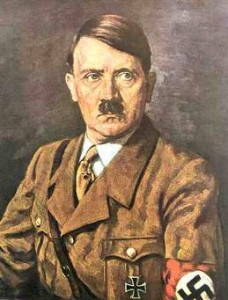 When Hitler took power in Germany, the first goal was to take away the guns from the people. He then dismantled the police, and set up his own police force…loyal only to him. This was the beginning of Hitler’s planned takeover…first of Germany, and then the world. That was his goal, but thankfully, the world fought back, and evil did not prevail.
When Hitler took power in Germany, the first goal was to take away the guns from the people. He then dismantled the police, and set up his own police force…loyal only to him. This was the beginning of Hitler’s planned takeover…first of Germany, and then the world. That was his goal, but thankfully, the world fought back, and evil did not prevail.
World War II had gone on for almost five years…long years. Hitler’s forces were reeling from the devastating effects of D-Day, and Paris was next in line for liberation, The Allied machine was marching in to Paris to remove the Nazi Regime. Hitler was furious, and decided that if his army was to be forced out, they would take the best of the memories and landmarks of Paris with them. He planned to leave the city in smoldering ruins. Hitler issued the first of several orders to the German commander of Paris, General Dietrich von Choltitz, to destroy the city. What Hitler had not anticipated, was that von Choltitz would not blindly do his bidding. The last last commander of Nazi-occupied Paris in 1944, von Choltitz disobeyed Adolf Hitler’s orders to destroy the city, and instead surrendered it to Free French forces when they entered the city on August 25th. Choltitz later asserted that his defiance of Hitler’s direct order stemmed from its obvious military futility, his affection for the French capital’s history and culture, and his belief that Hitler had by then become insane, while other sources point to the fact that he had little control of the city thanks to the operations of the resistance, and could not have carried out such orders. Nevertheless, von Choltitz has since been referred to as “The Saviour of Paris.”
As I look at the current circumstances in the United States, I am reminded of the days of Hitler’s reign of terror. The riots in the streets, the calls for gun control and defunding the police, and the removal of the statues marking our past…good and bad, are all reminiscent of the days of early World War II. Just as in the days of 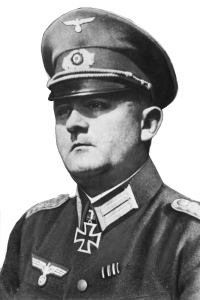 Hitler’s National Socialist Party, Socialism would not be good for America either. While the Democratic Party voters should understand that their values are like Hitler’s and yet, often blame the Republican party for being like Hitler, they are wrong. If they would look at history, instead of trying to remove our memory of the past, they would see just how alike Socialism is to Nazism and Hitler’s ways. Truly, the people of the United States need to wake up…and quickly. The decision to try to change our country to Socialism, is a slippery slope to communism, and the removal of the freedoms we hold so dear. We need to approach our future with our eyes wide open about the past of other nations, as well as the greatness that the American system of Capitalism has provided our nation with in the past. We like our freedom to let our voice be heard…a right that is found only in Capitalism. Don’t let the rights and privileges we so enjoy, be stolen from us by a handful of radical Socialists and Communists. The time to stand against Socialism and Communism is now!! Wake up America!!
Hitler’s National Socialist Party, Socialism would not be good for America either. While the Democratic Party voters should understand that their values are like Hitler’s and yet, often blame the Republican party for being like Hitler, they are wrong. If they would look at history, instead of trying to remove our memory of the past, they would see just how alike Socialism is to Nazism and Hitler’s ways. Truly, the people of the United States need to wake up…and quickly. The decision to try to change our country to Socialism, is a slippery slope to communism, and the removal of the freedoms we hold so dear. We need to approach our future with our eyes wide open about the past of other nations, as well as the greatness that the American system of Capitalism has provided our nation with in the past. We like our freedom to let our voice be heard…a right that is found only in Capitalism. Don’t let the rights and privileges we so enjoy, be stolen from us by a handful of radical Socialists and Communists. The time to stand against Socialism and Communism is now!! Wake up America!!
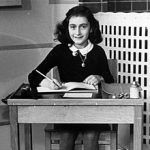
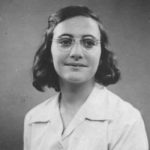 I recently listened to a book entitled, Treasures From The Attic, by Mirjam Pressler (in conjunction with Gerti Elias, wife of Buddy Elias, cousin of Anne Frank). I was not sure upon beginning the book, if it would hold any value concerning my interest in World War II and the Holocaust, but my concerns were quickly laid to rest as I listened to the story unfold. I’m not going to go into the story line really, except to say that the “treasures” that lay in the attic were partly about Anne Frank, but really more about the Frank family, and their torturous journey to learn the truth, and then to recover from it.
I recently listened to a book entitled, Treasures From The Attic, by Mirjam Pressler (in conjunction with Gerti Elias, wife of Buddy Elias, cousin of Anne Frank). I was not sure upon beginning the book, if it would hold any value concerning my interest in World War II and the Holocaust, but my concerns were quickly laid to rest as I listened to the story unfold. I’m not going to go into the story line really, except to say that the “treasures” that lay in the attic were partly about Anne Frank, but really more about the Frank family, and their torturous journey to learn the truth, and then to recover from it.
The many letters written to the various members of the family to other members of the family, told the tale of not just loss, but the tragic and horrific time of not knowing. It was the “not knowing” that most tore at my heart. First the fact that most of Otto Frank’s extended family had no idea that his little family; comprised of his wife, Edith and daughters Margot and Anne; had fallen into the hands of the evil Nazi Regime. As was the practice during the Holocaust, the family was separated, and Otto did not know of the fate of his wife and daughters at the time of his release from Auschwitz-Birkenau. Of course, we now know that Edith had passed away on January 6, 1945, of starvation. His daughter, Margot died sometime in February or March 1945 of Typhus, and his daughter, Anne also died in February or March 1945 of Typhus. The bodies of the girls were thrown behind a building and later into a mass grave as their burial. The Jews were considered no more important that trash, and so were treated as such. While this is horrific enough, worse was the fact that all too often no record was kept of the dead, or their place of burial.
It was here that I began to feel the horrible longing, dread, and finally grief that the Frank family was going through. As anyone who has lost a loved on and doesn’t know what happened can tell you, the not knowing is almost worse than the reality of what happened. Your mind can conjure up so many things, and for Otto, who had also been in the camp can readily attest, the reality of Auschwitz-Birkenau was beyond all human comprehension, unless you had been there, and then you could not get it out of your head. Still, the months of 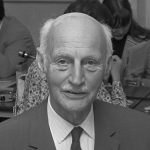
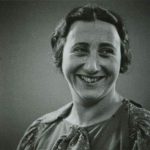 waiting for news of his family, followed by years of grief and heartache over what they had suffered, was beyond anything that most people can fathom. As I finished the book, I felt a tremendous sense of loss, not only for the Frank family, but for the many Jewish families, who suffered in the camps, and after the Holocaust as they endeavored to locate lost loved ones, or at least to learn their fate. Many searched for years, and some have never found out the fate of their loved ones at all. It was truly heartbreaking, and yet, that search and not knowing, was the reality that was faced by many Holocaust survivors.
waiting for news of his family, followed by years of grief and heartache over what they had suffered, was beyond anything that most people can fathom. As I finished the book, I felt a tremendous sense of loss, not only for the Frank family, but for the many Jewish families, who suffered in the camps, and after the Holocaust as they endeavored to locate lost loved ones, or at least to learn their fate. Many searched for years, and some have never found out the fate of their loved ones at all. It was truly heartbreaking, and yet, that search and not knowing, was the reality that was faced by many Holocaust survivors.
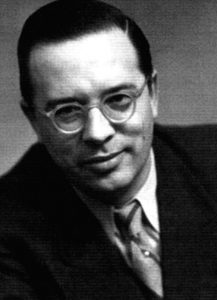 During the Holocaust, the majority of known Jews in any given country, had a very slim chance of surviving the war, but the Denmark Jews somehow managed to hold an impressive 95% survival rate record. Much of that was due to one man, Georg Ferdinand Duckwitz, who became an unlikely hero of the Jewish people…mainly because he was a German diplomat serving as an attaché for Nazi Germany in occupied Denmark at the time. In fact, that is what makes what he did so strange.
During the Holocaust, the majority of known Jews in any given country, had a very slim chance of surviving the war, but the Denmark Jews somehow managed to hold an impressive 95% survival rate record. Much of that was due to one man, Georg Ferdinand Duckwitz, who became an unlikely hero of the Jewish people…mainly because he was a German diplomat serving as an attaché for Nazi Germany in occupied Denmark at the time. In fact, that is what makes what he did so strange.
Duckwitz was born on September 29, 1904, in Bremen, Germany. He was part of an old patrician family in the Hanseatic City. After college, he began a career in the international coffee trade. From 1928 until 1932 Duckwitz lived in Copenhagen, Denmark. Upon moving back to Bremen, November 1932 he met Gregor Strasser, who was the leader of the leftist branch of the German nationalistic Nazi Party. While talking to Strasser, Duckwitz found that “elements of Scandinavian socialism [were] connected with nationalistic feelings” and this led to his decision to join the Nazi Party, and subsequently on July 1, 1933, to join the Nazi Party’s Office of Foreign Affairs in Berlin.
What had at first seemed to him to be a party who’s values agreed with his, he soon became increasingly disillusioned by Nazi politics. In a letter written June 4, 1935 to Alfred Rosenberg, the head of the office, he wrote, “My two-year employment in the Reichsleitung [i.e. executive branch] of the [Nazi Party] has made me realize that I am so fundamentally deceived in the nature and purpose of the National Socialist movement that I am no longer able to work within this movement as an honest person.” That move in itself strikes me now, as scary, considering how the known Nazi party functioned. He may not have realized hoe dangerous his words were, but I think they could have gotten him killed. Around the same time the Gestapo (secret police) made its first notes on Duckwitz after he sheltered three Jewish women in his Kurfürstendamm apartment during a local anti-Semitic Sturmabteilung event. He later wrote that during this time period he became “a fierce opponent of this [Nazi] system”.
After 1942, Duckwitz worked with the Nazi Reich representative Werner Best, who organized the Gestapo. On September 11, 1943 Best told Duckwitz about the intended round-up of all Danish Jews on October 1, 1943. A horrified Duckwitz travelled to Berlin in an attempt to stop the deportation through official channels. When that failed, he flew to Stockholm two weeks later, saying he was going to discuss the passage of German merchant ships. While there, he contacted Prime Minister Per Albin Hansson and asked whether Sweden would be willing to receive Danish Jewish refugees. A couple of days later, Hansson came back with the promise of a favorable reception. On September, 29, 1943, Duckwitz contacted Danish social democrat Hans Hedtoft and notified him of the intended deportation. Hedtoft warned the head of the Jewish community CB Henriques and the acting chief rabbi Marcus Melchior, who spread the warning. Sympathetic Danes in all walks of life organized an immediate mass escape of over 7,200 Jews and 700 of their non-Jewish relatives by sea to Sweden. Duckwitz’ immediate action and the willingness of the Danish and Swedish citizens saved the lives of 95% of Denmark’s Jewish population. They were the only European nation to save almost all their Jewish population from certain death at the hand’s of Hitler’s evil regime.
Somehow, Duckwitz was never caught committing his act of “treason” against the Third Reich, and he stayed in good standing with the Nazi regime. After the war, Duckwitz remained in the German foreign service. From 1955–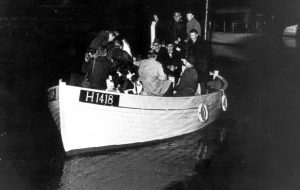 1958 Duckwitz served as West German ambassador to Denmark and later as the ambassador to India. When Willy Brandt became Foreign Minister in 1966, he made Duckwitz Secretary of State in West Germany´s Foreign Office. After Brandt became Chancellor, he asked Duckwitz to negotiate an agreement with the Polish government. Brandt’s work culminated in the 1970 Treaty of Warsaw. Duckwitz worked as Secretary of State until his final retirement in 1970. On March 21, 1971 the Israeli government named him Righteous Among the Nations and included him in the Yad Vashem memorial. He died two years later, on February 16, 1973 at the age of 68.
1958 Duckwitz served as West German ambassador to Denmark and later as the ambassador to India. When Willy Brandt became Foreign Minister in 1966, he made Duckwitz Secretary of State in West Germany´s Foreign Office. After Brandt became Chancellor, he asked Duckwitz to negotiate an agreement with the Polish government. Brandt’s work culminated in the 1970 Treaty of Warsaw. Duckwitz worked as Secretary of State until his final retirement in 1970. On March 21, 1971 the Israeli government named him Righteous Among the Nations and included him in the Yad Vashem memorial. He died two years later, on February 16, 1973 at the age of 68.

 My grand niece, Aleesia Spethman is a very busy girl, with many interests. She has three older brothers, Xander, Zack, and Isaac, all of whom are in football, but lets face it, football is just not for Aleesia. Aleesia is in gymnastics, and really enjoys it. There are a number of family members who have taken gymnastics, so I think Aleesia comes by her talents honestly. In the summer, Aleesia love to so swimming, especially if a water slide is involved. Her parents, Steve and Jenny Spethman try to take the kids to Rapid City to the water park at least once a year.
My grand niece, Aleesia Spethman is a very busy girl, with many interests. She has three older brothers, Xander, Zack, and Isaac, all of whom are in football, but lets face it, football is just not for Aleesia. Aleesia is in gymnastics, and really enjoys it. There are a number of family members who have taken gymnastics, so I think Aleesia comes by her talents honestly. In the summer, Aleesia love to so swimming, especially if a water slide is involved. Her parents, Steve and Jenny Spethman try to take the kids to Rapid City to the water park at least once a year.
Since Covid-19 closed the schools 2½ months early this year, Aleesia found herself in the same boat as so any other students…home schooling. Aleesia did not enjoy home schooling. She thought it was very boring sitting in 
 front of a computer at the dining room table. I think many of the students felt that way, but then home schooling was not what anyone had planned for this school year, and to have it happen 2½ months before school was supposed to get out, threw everyone into a bit of a tailspin. While Aleesia did not like home schooling, she did like having the extra time with her brothers. It was a rare treat for Aleesia to get to spend so much extra time with her brothers.
front of a computer at the dining room table. I think many of the students felt that way, but then home schooling was not what anyone had planned for this school year, and to have it happen 2½ months before school was supposed to get out, threw everyone into a bit of a tailspin. While Aleesia did not like home schooling, she did like having the extra time with her brothers. It was a rare treat for Aleesia to get to spend so much extra time with her brothers.
This year has been different for Aleesia in a number of ways. Because her mom got a part-time job, Aleesia went to camp. She went to camp, because daycare is for babies, as we all know. That was a little hard on both Aleesia and Jenny, because they are best friends. They love doing things together. It doesn’t matter what they are doing, 
 shopping, taking a walk, playing, or just watching television.
shopping, taking a walk, playing, or just watching television.
Aleesia got to have a birthday party with her friends this year, and that is unusual for her, because having her birthday in the summer often prohibits the friend birthday party that so many people get. The lack of travel this year kept many people at home and that made all the difference. I’m very happy for her. Today is Aleesia’s 8th birthday Happy birthday Aleesia!! Have a great day!! We love you!!
 People aren’t usually evil. Nor are the easily accepting of evil. Usually, in order to get people to accept evil, it has to be hidden in a way. It has to be slipped in when they aren’t looking…slowly, so that it is accepted as normal…or a new normal. When Hitler ordered the systematic murder of the mentally ill and handicapped people in 1939, the people of Germany were outraged. Never before had any leader made such a boldly, callous move. Like throwing a frog in a pot of boiling water, they jumped…fought back.
People aren’t usually evil. Nor are the easily accepting of evil. Usually, in order to get people to accept evil, it has to be hidden in a way. It has to be slipped in when they aren’t looking…slowly, so that it is accepted as normal…or a new normal. When Hitler ordered the systematic murder of the mentally ill and handicapped people in 1939, the people of Germany were outraged. Never before had any leader made such a boldly, callous move. Like throwing a frog in a pot of boiling water, they jumped…fought back.
Hitler moved too fast, and the people rebelled. The program, known as Hitler’s Euthanasia Department that began in 1939, came under the heading of unhidden evil. Hitler misjudged his people. He thought they would follow blindly along. When they began complaining about the T.4 program, which began as the systematic killing of children deemed “mentally defective,” Hitler had to act. He had been transporting children from all over Germany to a Special Psychiatric Youth Department and killing them. Later, certain criteria were established for non-Jewish children. They had to be “certified” mentally ill, schizophrenic, or incapable of working for one reason or another. Jewish children already in mental hospitals, whatever the reason or whatever the prognosis, were automatically to be subject to the program. The victims were either injected with lethal substances or were led to “showers” where the children sat as gas flooded the room through water pipes. The program was then expanded to adults. The program was heinous in every way.
Before long the outraged protests began mounting within Germany, especially by doctors and clergy. Some of them even dared to write to Hitler directly and describe the T.4 program as “barbaric.” Others circulated their opinions more discreetly. Heinrich Himmler, was the head of the SS then, and the man who would direct the systematic extermination of European Jewry. Himmler had only one regret…that the SS had not been put in charge of the T.4 program. He says of the protesting, “We know how to deal with it correctly, without causing useless uproar among the people.” Finally, in 1941, Bishop Count Clemens von Galen denounced the euthanasia 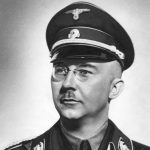 program from his pulpit. Hitler was concerned that other nations would get involved with such publicity about his program. He ordered the program suspended on August 18, 1941…at least in Germany. But 50,000 people had already fallen victim to it.
program from his pulpit. Hitler was concerned that other nations would get involved with such publicity about his program. He ordered the program suspended on August 18, 1941…at least in Germany. But 50,000 people had already fallen victim to it.
Hitler was not to be deterred. He now knew that he had to keep his programs hidden, if he was going to be able to carry out his plans. So, he revived the program in occupied Poland. The people there already had no say in the matter, and he hoped that it would be far enough from Germany so that the German people would not know what was going on. It worked for a time, but in the end, the world would know about the evil he tried so hard to keep hidden, and in the end the number of murder victims was far more than a mere 50,000…it was more like 11 million people.
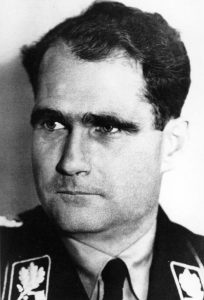 Spandau Prison was located on Wilhelmstraße in the borough of Spandau in western Berlin. It was constructed in 1876. It initially served as a military detention center. From 1919 it was also used for civilian inmates. It held up to 600 inmates at that time.
Spandau Prison was located on Wilhelmstraße in the borough of Spandau in western Berlin. It was constructed in 1876. It initially served as a military detention center. From 1919 it was also used for civilian inmates. It held up to 600 inmates at that time.
Rudolf Walter Richard Heß was born on April 26, 1894 in Ibrahimieh, a suburb of Alexandria, Egypt, which was at that time under British occupation, even though it was a part of the Ottoman Empire. Heß was born into a wealthy German family. His parents were Johann Fritz Heß and Klara Munch Heß. He was a German politician and a leading member of the Nazi Party in Nazi Germany. Heß was appointed Deputy Führer to Adolf Hitler in 1933, and served in that position until 1941, when he flew solo to Scotland in an attempt to negotiate peace with the United Kingdom during World War II. He was taken prisoner and eventually convicted of crimes against peace, serving a life sentence. I’m not sure what he thought he was going to accomplish, going in there by himself, or if he later thought he could get back in Hitler’s “good graces,” but the attempt ended his freedom for the rest of his life.
Heß joined the Nazi Party on July 1, 1920 and was at Hitler’s side on November 8, 1923 for the Beer Hall Putsch, a failed Nazi attempt to seize control of the government of Bavaria. While serving time in jail for this attempted coup, he assisted Hitler with his book, “Mein Kampf,” which became a foundation of the political platform of the Nazi Party. Hitler decreed on the outbreak of war on September 1, 1939 that Hermann Göring was his official successor, and named Heß as next in line. In addition to appearing on Hitler’s behalf at speaking engagements and rallies, Heß signed into law much of the government’s legislation, including the Nuremberg Laws of 1935, which stripped the Jews of Germany of their rights in the lead-up to the Holocaust.
When Heß made his solo flight to Scotland on May 10, 1941, it would appear he was willingly committing treason against his government, but that did not impress the British government, who probably thought it was all a ploy…and maybe it was. Most of us will never know. Heß was arrested and finished out the war in a British prison camp. When the war ended, he was returned to Germany to stand trial in the Nuremberg Trials of major war-criminals in 1946. During much of the trial, he claimed to be suffering from amnesia, but he later admitted this was a ruse. The Court convicted him of crimes against peace and of conspiracy with other German leaders to commit crimes. He was to served a life sentence in Spandau Prison…the Soviet Union blocked repeated attempts by family members and prominent politicians to win his early release.
During the time Heß was at Spandau Prison, there were only seven prisoners there. Konstantin von Neurath, Erich Raeder, Karl Dönitz, Walther Funk, Albert Speer, Baldur von Schirach, and Heß. The men all arrived at Spandau from Nuremberg on July 18, 1947. Of the seven, three were released after serving their full sentences, while three others, including Raeder and Funk, who were given life sentences, were released earlier due to ill health. Between 1966 and 1987, Rudolf Hess was the only inmate in the prison and his only companion was the warden, Eugene K Bird, who became a close friend. Bird wrote a book about Hess’s imprisonment titled The Loneliest Man in the World. In his book he claims to have been told what Heß’s intentions were during his ill-fated attempt at peace talks in 1941.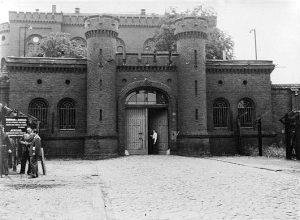
I can’t imagine what it must have been like to be the only prisoner in a prison that once held 600 men. My guess is that it was lonely for the warden too, although he could leave when he wanted to, and Heß could not. The men did develop a friendship, but that cannon really change the feel of emptiness that persisted over the prison for 21 long years of virtual emptiness. While Heß lived a long life, the isolation finally got the better of him, and he hanged himself on August 17, 1987. He was 93 years old. Following his death, the prison was demolished, because the authorities did not want it to become a neo-Nazi shrine. The site was later rebuilt as a shopping center for the British forces stationed in Germany.
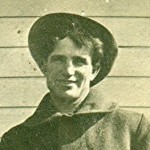
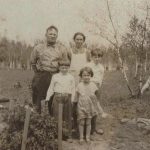 I never had the opportunity to get to know my Grandpa Allen Luther Spencer, because he passed away before my parents were married, and 4½ years before I was born. Life was not always easy for my grandfather. His first marriage ended in divorce, following the death of his daughter, Dorothy, which was quickly followed by the birth of his son, Norman. The loss of a child can be so devastating, that many people never recover, and many marriages fail. It was a dark time for him, until he met my grandmother.
I never had the opportunity to get to know my Grandpa Allen Luther Spencer, because he passed away before my parents were married, and 4½ years before I was born. Life was not always easy for my grandfather. His first marriage ended in divorce, following the death of his daughter, Dorothy, which was quickly followed by the birth of his son, Norman. The loss of a child can be so devastating, that many people never recover, and many marriages fail. It was a dark time for him, until he met my grandmother.
After their marriage and four more children, Laura in 1912, Bill in 1922, Allen (my dad) in 1924, and Ruth in 1925, it looked like his life was on the right track again. Of course, like many other people, this good period was followed by the Great Depression. Thankfully, my grandfather was a carpenter (mostly for the Great Northern Railway), and as near as I can tell, had a job throughout the Great Depression. Still, times were tough, and I’m sure the wages were not what a family of six really needed to live. Most people struggled during the Great Depression.
My grandfather was a product of his circumstances, and the times he lived in, and the two things together created a stressful life for him and his second family. Much more was expected of the two older children, and feelings were raw at times. The younger two children really never remember his being so hard on them. Grandpa had specific ideas of things the children should learn and do. All of the children learned to play the violin and some learned the guitar. My Aunt Laura never really liked learning to play the violin, but the rest of the children did…or at least they did later. Grandpa Spencer may not have been an easy teacher, or maybe it’s just hard to learn from your dad.
No matter what kind of a man my grandfather was, and whether circumstances led to his troubles, his children loved him very much. Like any family, kids and parents “lock horns” sometimes. That doesn’t mean you don’t love them. When my grandfather was dying, my dad drove from Casper, Wyoming to Superior, Wisconsin, 980 
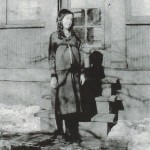 miles, in 17 hours. That might not seem like a big deal these days, but cars didn’t do what they can do now, and speeds were different then too. Needless to say, my dad made it home to see his dad before he passed away, and he was always thankful that he made the trip, and always thankful that he saw his dad one more time. I only wish I could have met him and gotten to know him too. I feel like I missed out, on my grandfather and my Grandma Spencer, who passed away when I was 2½ months old. Happy birthday in Heaven Grandpa Spencer. I look forward to meeting you someday soon.
miles, in 17 hours. That might not seem like a big deal these days, but cars didn’t do what they can do now, and speeds were different then too. Needless to say, my dad made it home to see his dad before he passed away, and he was always thankful that he made the trip, and always thankful that he saw his dad one more time. I only wish I could have met him and gotten to know him too. I feel like I missed out, on my grandfather and my Grandma Spencer, who passed away when I was 2½ months old. Happy birthday in Heaven Grandpa Spencer. I look forward to meeting you someday soon.
